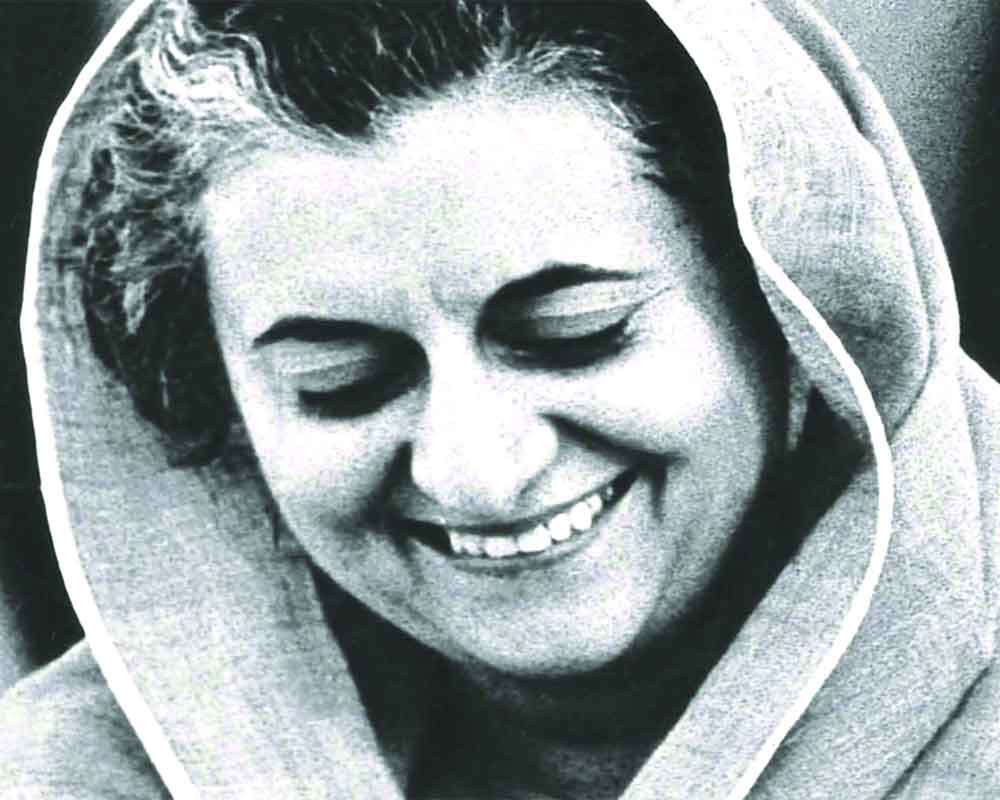Late Prime Minister Indira Gandhi hated marigold flower, although in death it was strewn all over her body. Many such hitherto unknown aspects of 11 ‘newsmakers’ have been unravelled by Kumkum Chadha in her book, The Marigold Story. This is not a gushing account of their accomplishments; rather it captures their weaknesses. An edited excerpt:
Indira Priyadarshini Gandhi, India’s third Prime Minister, was allergic to marigolds. Throughout her life, her lieutenants stopped people from taking the gold-flower near her. While no one could stop her admirers from bringing them in bunches, the garlands were immediately taken away, and the petals were swiftly brushed aside. If someone still managed to smuggle the flower in, Indira Gandhi would frown to show her displeasure. Her silence was signal enough that she hadn’t taken well to the transgression.
But her anger was never directed at people who spent days, often weeks, to meet her. It was her staff who had to face her ire, for they were trained rigorously to handle her likes and dislikes. It was incumbent upon them to ensure that things went the way she wanted: Perfectly, with clockwork precision. A slip-up may not have cost them their jobs, but it did earn her indignation. For the faithful, including the man who routinely carried an umbrella over her head, it was worse than being booted out.
It was, therefore, ironic that in her death, several such details were missed out. Were Indira Gandhi to have her way, she would have never allowed for what she may have described as ‘violations’. But she lay still and lifeless: Her bullet-ridden body bedecked in marigolds. The gold-flower that was kept away during her entire life, clung to her in death. But the shock of her sudden and violent death was so intense that even for her coterie, the issue of her allergy to the flower may have seemed trivial. Death numbs everyone, but for someone like Indira Gandhi to die the way she did, it was nothing short of a catastrophe. For India, it was like hitting a dead end, or at least that is what it had seemed like at that point in time.
She had ruled with an iron hand for almost 16 years and for most parts, turned around the country when few had the grit and determination to steer the fortunes of hundreds and thousands of deprived Indians. Equally it was true that she did not encourage a second line of leadership, making it clear that none other than a Nehru-Gandhi was fit to rule India.
Indira Gandhi’s death had decidedly created a vacuum. For people like me, who were a generation apart, it had also posed the ‘who next’ question. Sanjay Gandhi, the obvious heir-apparent, had died before his mother, and Rajiv Gandhi, the reluctant one. More than Indira Gandhi’s death and the sorrow that came with it, what was worrying was India’s future and the lonely road that lay ahead.
On some lonely, dark nights, Alfred Tennyson and William Butler Yeats are my companions. I can’t explain the how and why of it, but I have often read and re-read their verses and liberally quoted and often misquoted them while churning a story in my head. But in the context of ‘India without Indira’, I’d failed to evoke Tennyson’s optimism about the old order changing, yielding place to the new or like the Victorian poet, comfort myself. His lines simply did not fit in the turbulent times India was facing. Introspect what I’d felt was more in sync with Yeats’ The Second Coming:
Things fall apart; the centre cannot hold
Mere anarchy is loosed upon the world.
Like millions of Indians, I was unsure if the Second Coming was at hand; whether another messiah would descend from the heavens to bail out a country that had more problems than solutions. Of course, Indira Gandhi was no messiah. She was more of a cross between a goddess and the poet’s vision of a rough beast. Among the uninitiated, she was worshipped; in the politics she practiced, her opponents likened her to a typhoon which destroyed at will. At one level, she had built India; at another, perhaps, destroyed its core. But as I had felt then, and do so even now, I believe that she did more good than harm.
From a distance, I watched Mrs Gandhi’s body lie in state. It was in New Delhi’s Teen Murti House, where she had spent several years as a young woman with her father, Jawaharlal Nehru, India’s first Prime Minister. It was the late Vasant Sathe, the Congress leader from Maharashtra and once Union Minister for Information and Broadcasting in Mrs Gandhi’s Cabinet, who had taken me along to Teen Murti House. All through the drive, I don’t recall how long it was, but Vasant Sathe had sobbed like child. For him, it was like losing his mother, as his wife later told me. We entered from the ante-room and stood near where her head lay: Bereft of the uneasy crown that she had symbolically and willingly worn. Her head was covered with the pallu of her sari. Her face was swollen and looked nothing like it once had. It was difficult to see her the way she was. Silent and still.
It was equally tough to see people bring in marigolds and add to the layers over her body. I wanted to step over and remove each one… specially those which touched her face. That I thought would be my tribute to a woman who had allowed me easy access into her home.
There was no special bond between us, except as journalist, I would often hover around her for off-beat stories, and Mrs Gandhi cooperated to the extent that I usually went back with one. “Marigolds,†Indira Gandhi often told me, “are not for meâ€. Her words came back as I helplessly watched hundreds of people come in and heap them over her.
Her marigold allergy seemed to have skipped RK Dhawan’s mind too. He was in a daze. It was too much to expect him to worry about such details; it really didn't matter anymore. But Mrs Gandhi was a woman who had a keen eye for detail. Had this happened to anyone else, she sure would have stepped in to correct it.
RK Dhawan was Indira Gandhi’s closest aide. As long as she lived, he was forever by her side, ensuring that nothing went amiss. There are, however, no easy answers for how things had gone so horribly wrong on the last day of a nippy October morning in 1984.
Excerpted with permission from The Marigold Story by Kumkum Chadha; Westland, Rs 699


























